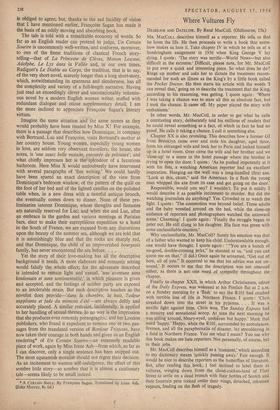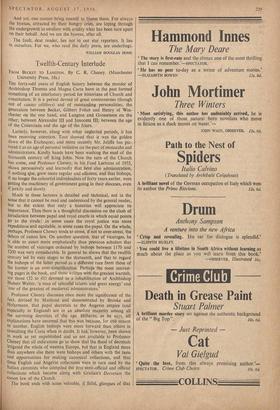Where Vultures Fly
DEADLINE AND DATELINE. By Rene MacColl. (Oldbourne, 15s.) MR. MACCOLL describes himself as a reporter. He tells us that he loves the life. He then proceeds to write a book that some- how makes us hate it. Take chapter IV in which he tells us of a Sandringham assignment in 1936 when King George V lay dying. I quote: 'The story was terrific—World News—but also difficult in the extreme.' Difficult, please note, for Mr. MacColl to put over a quick and interesting piece. So what does he do? Rings up mother and asks her to dictate the treatment recom- mended for such an illness as the King's by a little book called the Pocket Doctor. He then starts his article with the words 'I can reveal that,' going on to describe the treatment that the King, according to his reasoning, was getting. I quote again: 'Where I was taking a chance was to state all this as absolute fact, but I took the chance. It came off. My paper played the story with enthusiasm.'
In other words, Mr. MacColl, in order to get what he calls a contrasting story, deliberately told his millions of readers that he could reveal something as a fact, of which in fact he had no proof. He calls it taking a chance. I call it something else.
Chapter XX is also revealing. This describes how a former GI from Brooklyn came over and stole his daughter, aged three, from his estranged wife and took her to Paris and locked himself up in a hotel room. Over came the wife and her brother and we 'close-up' to a scene in the hotel passage where the brother is trying to open the door. I quote: 'As he pushed impotently at it with his fists, a watching American reporter had an excellent inspiration. Hanging on the wall was a long-handled (fire) axe. "Look at this, chum," said the American. In a flash the young man whipped the axe from its case and got going on the door.'
Responsible, would you say? I wouldn't. To put it mildly I would describe it as possible incitement to murder. But did the watching journalists do anything? Yes. Crowded in to watch the fight. I quote: 'The commotion was beyond belief. Three adults and the baby wrestled around on the bed, while the close-up audience of reporters and photographers watched the untoward scene.' Charming! I quote again: 'Finally the struggle began to peter out. He still clung to his daughter. His face was green with some unclassifiable emotion.'
Why unclassifiable, Mr. MacColl? Surely his emotion was that of a father who wanted to keep his child. Understandable enough, one would have thought. I quote again : "You are a bunch of no-good, double-crossing jerks," he shouted at us, "and you can quote me on that." (I did.) Once again he screamed, "Get out of here, all of you." It occurred to me that his advice was not un- sound.' It occurs to me that the description was not unsound either, as there is not one word of sympathy throughout the chapter.
Finally to chapter XXII, in which Arthur Christiansen, editor of the Daily Express, was wakened at his Pimlico flat at 2 a.m. on a Sunday morning by a 'flash' to say the R101 had crashed with terrible loss of life in Northern France. I quote: 'Chris streaked down into the street in his pyjamas. . . . It was a terrific fight against time. Chris won. The Sunday Express had a massive and sensational scoop. At nine the next morning he was sitting around, bleary-eyed, unshven but happy.' Mark that word 'happy.' Happy, while the R101, surrounded by ambulances, firemen, and all the paraphernalia of disaster, lay smouldering in a field in Northern France. You see what I mean? You see why this book makes me hate reporters. Not personally, of course, but in their jobs.
Mr. MacColl describes himself as a 'transient,' which according to my dictionary means 'quickly passing away.' Fair enough. It would be nice to describe reporters as the butterflies of literature. But, after reading this book, I feel inclined to label them as vultures, winging down from the cloud-cuckoo-land of Fleet Street to settle on a dead branch with their bottles of Scotch and their fountain pens tucked under their wings, detached, inhuman voyeurs, feeding on the flesh of tragedy.
And yet, one cannot bring oneself to blame them. For always the hyenas, attracted by their hungry cries, are loping through the undergrowth to swallow with avidity what has been torn apart on their behalf. And we are the hyenas, after all.
The fault, dear reader, lies not in our star reporters. It lies in ourselves. For we, who read the daily press, are underlings.
WILLIAM DOUGLAS HOME



































 Previous page
Previous page